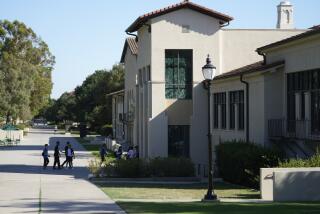South County College Board Scotches High-Tech Initiative
- Share via
An Orange County community college board put an end to plans for an ambitious digital learning center at the closed Tustin Marine base Friday when it took the unusual step of voting to turn down $1 million remaining from a state grant.
The South Orange County Community College District previously was awarded the first half of a two-year, $2-million grant to convert one of the base’s helicopter hangars into a center to teach high-tech disciplines such as animation, laser optics and virtual reality, and would include a sound stage. Another program would use virtual reality to train nurses.
Then-Chancellor Cedric Sampson had called the project, known as DI-CAST, the most ambitious the district had undertaken. The hangar was supposed to bring together students, professors and companies to create business spinoffs and provide training for an industry with a shortage of workers.
High-tech companies would provide, at a discount or free, hardware and software the district couldn’t afford, and in exchange would get a place to demonstrate those products. Among the companies interested were Motorola and Cisco.
The South County district had received nearly $1 million in grant money from the state community college chancellor’s office for the first year of the project and needed to submit perfunctory paperwork for the second $1 million.
But a majority of trustees--Dorothy Fortune, Thomas A. Fuentes, John S. Williams and Nancy M. Padberg--voted not to seek the money, citing questions about the availability of property on the former base, which is under controversy.
“We do not have space for this program,” Fuentes said. “We cannot turn to taxpayers with bait and switch.”
Fortune, questioning the plan itself, called reports she had received from DI-CAST “misleading.”
In a memo to the trustees, she downplayed DI-CAST officials’ efforts to come up with new courses. “I do not believe that ‘curriculum development’ is of significant value since that is essentially . . . easily available on Web sites and [at] colleges around the nation,” she wrote.
And if the former Marine base could not be used, Fortune also insisted that the grant application was false. The base is at the center of a tug-of-war between Tustin, on one side, and the Santa Ana Unified and Rancho Santiago college districts, which want 100 acres for a unique school site.
John Avakian, director of the new-media initiative for the state community college system’s economic development program, said grant applications can be amended.
And Marly Bergerud, the district’s dean of business and vocational education, one of DI-CAST’s primary planners, called the trustees’ vote “an abuse of power.”
South Orange County received the largest amount given to any campus by the state college system under its Industry Driven Regional Collaborative Grant program. The state chancellor’s office provides about $15 million annually to train workers to match a regional business need.
Trustee David B. Lang wondered if turning down the money could have long-term funding implications. “We’re sending the wrong message to the state chancellor’s office,” he said.
Trustee Williams responded: “Frankly, I don’t care what they think if we don’t take the grant.”
Bergerud said there was room for DI-CAST elsewhere on the district’s two campuses, Saddleback and Irvine Valley colleges. She said the grant also contained $90,000 that could be used to rent facilities.
Friday’s vote was the latest blow to the district’s plans for high-tech education. Trustees previously decided not to apply for $1.5 million in federal money for a business incubator to be housed in the hangar. The funds instead went to the North Orange County Community College District.
Killing the DI-CAST plan raises questions about the district’s commitment to technology education and to Don Goodwin, who was recruited to be vice chancellor in charge of the project. Goodwin oversaw a similar base conversion project in Colorado. His contract runs until June 2002.
Since Fuentes’ election in November, Goodwin said, the board has lost enthusiasm for partnerships with companies. “We’re trying to work through it,” he said.
Asked if he would leave the district, Goodwin replied, “Possibly, and I certainly have shared that with the board.”
More to Read
Sign up for Essential California
The most important California stories and recommendations in your inbox every morning.
You may occasionally receive promotional content from the Los Angeles Times.











